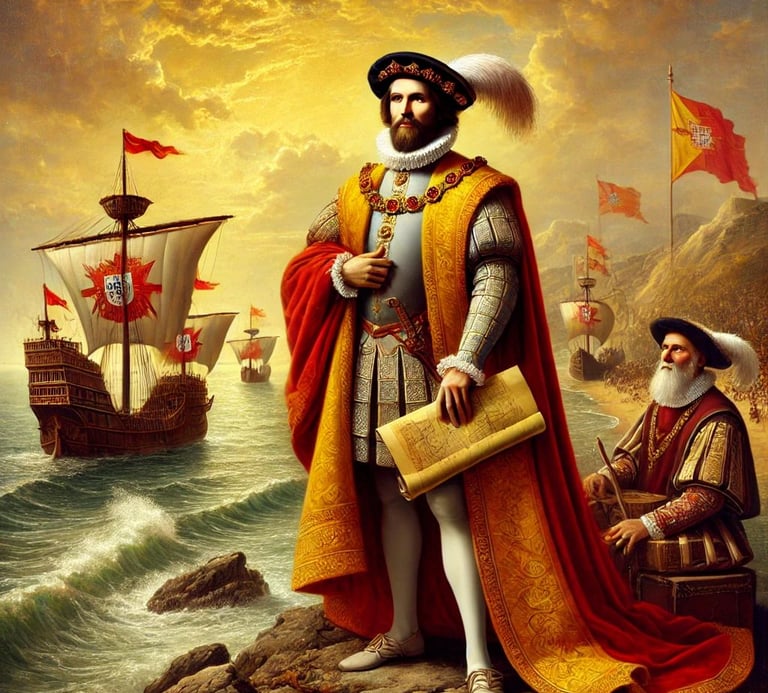The Rise and Fall of the Portuguese Empire's Monetary System: Lessons from History
EDUCATION ON GOLD & SILVER


The Origins of the Portuguese Empire's Economic Framework
The emergence of the Portuguese Empire's economic framework can be traced back to the late 15th century, during a transformative era characterized by maritime exploration and trade expansion. As Portugal sought to establish itself as a dominant maritime power, it embarked on ambitious voyages that led to the discovery of new trade routes to Africa, India, and Brazil. These routes not only enhanced Portugal's geopolitical influence but also introduced significant amounts of gold and silver into its economy, shaping the foundational principles of its monetary system.
A key figure in these early developments was Prince Henry the Navigator, who played a pivotal role in promoting exploration during the early 1400s. Under his patronage, navigators ventured along the West African coast, paving the way for the exploitation of gold resources in the region. This influx of precious metals bolstered Portugal's economic standing and laid the groundwork for its monetary policy, which heavily relied on these assets to facilitate trade and bolster national wealth.
The expansion of Portuguese trade routes was further supported by the leadership of King John II, who is credited with consolidating the empire's economic framework. His administration emphasized the importance of securing trade agreements and establishing a robust naval presence that would protect Portuguese interests overseas. The introduction of the cruzado, a gold coin, signified the importance of precious metals in the Portuguese monetary system, fostering an economy that thrived on trade and exploration.
In summary, the origins of the Portuguese Empire's economic framework were deeply intertwined with its maritime ventures and the pivotal roles played by influential leaders like Prince Henry the Navigator and King John II. Through systematic exploration and the strategic establishment of trade routes, Portugal crafted a monetary system that relied on the richness of its newfound resources, establishing a model for early global commerce.
The Golden Age: Wealth Accumulation and Economic Growth
The late 15th to early 17th centuries marked a transformative phase for the Portuguese Empire, heralded as its Golden Age. Fueled by exploration and maritime conquests, this period witnessed unprecedented wealth accumulation from the colonies, particularly in gold and silver, which significantly bolstered the economy of Portugal. As vast resources flowed into the country, the economic landscape began to flourish, supported by innovative financial strategies that transformed the nation into a formidable trading hub.
Central to this economic expansion was the establishment of the Casa da Índia, a trading company responsible for overseeing the burgeoning trade with Asia, Africa, and the Americas. This institution played a pivotal role in consolidating and managing the influx of wealth, ensuring that the Portuguese Empire could effectively govern its vast trading network. The Casa da Índia not only coordinated the shipping of goods but also facilitated the arrangement of trade agreements that provided Portugal with a competitive edge over rival nations.
During this prosperous era, notable figures such as King Manuel I wielded considerable influence over economic policy. Under his reign, the kingdom experienced significant growth in trade and commerce, largely attributed to his support for maritime expeditions that sought new routes and resources. Furthermore, Manuel I's strategic alliances and diplomatic initiatives helped to secure exclusive trade partnerships, which enriched the empire’s coffers and expanded its influence on the global stage.
The combination of abundant resources, strategic trading advancements, and effective leadership contributed to the remarkable economic prosperity of the Portuguese Empire during its Golden Age. However, the lessons learned during this vibrant period of wealth accumulation would later inform the empire’s responses to challenges it faced in the subsequent centuries.
The Decline: Economic Mismanagement and External Pressures
The decline of the Portuguese Empire's monetary system in the late 17th and 18th centuries can be attributed to a combination of economic mismanagement and external pressures. One of the primary issues was the empire's over-reliance on precious metals, particularly gold and silver from its colonies in Brazil and Africa. This dependence created a volatile economy that became increasingly susceptible to fluctuations in the global markets and production levels. As resources were extracted predominantly for export, local economies stagnated, leading to a misallocation of resources that favored imperial interests over local development.
In addition to the mismanagement of resources, competition from emerging powers, such as Britain and the Netherlands, further compounded the decline of the Portuguese monetary system. These nations began to challenge Portugal's dominance in global trade through innovative policies and stronger naval capabilities. The rise of these competitors diminished Portugal's market share, ultimately destabilizing its economy. Tariffs and trade restrictions imposed by rival nations eroded the profitability of Portuguese exports, exacerbating economic difficulties and revealing flaws in the monetary system.
Moreover, corruption and mismanagement under leaders like the Marquis de Pombal complicated the situation. Although Pombal attempted reforms to restore economic order, his controversial policies sometimes backfired, leading to resentment and inefficiency. Thus, the confluence of these factors crystallized the decline of the Portuguese Empire’s monetary system and exemplifies the lessons that can be learned from history regarding economic management and resilience.
Lessons from the Portuguese Monetary System: The Role of Precious Metals Today
The Portuguese Empire's monetary system serves as a historical lens through which we can examine the crucial role of precious metals in economic stability. The empire's initial prosperity stemmed largely from its vast reserves of gold and silver, fueling trade and economic growth. However, the eventual overreliance on these metals also contributed to its decline, highlighting the need for a balanced monetary policy that integrates precious metals judiciously.
In today’s economy, gold and silver continue to maintain their status as a vital store of value. This is especially relevant during periods of economic uncertainty, where traditional currencies are subject to volatility. Nations worldwide have increasingly recognized the importance of diversifying their reserves, adapting the lessons learned from historical narratives such as that of the Portuguese Empire. For countries grappling with inflation and instability in their fiat currency systems, precious metals provide an anchor that can help restore confidence among investors and the general populace.
The modern implications for currency stability illustrate that incorporating gold and silver into national monetary systems can bolster economic resilience. By using these precious metals as a foundation, governments can enhance their capacity to respond to financial crises. This can mitigate the risks associated with solely relying on fiat currency, which, as history shows, is vulnerable when confidence wanes.
For policymakers today, a prudent approach toward monetary systems involves recognizing the enduring value of precious metals. By striking a balance between the use of gold and silver and the dynamics of modern finance, nations can cultivate stable economies capable of withstanding periodic shocks. Historical examples from the Portuguese Empire highlight the necessity of this balanced approach, urging contemporary leaders to rethink their strategies in the context of an ever-evolving global economy.
